Five Maryland locations to serve you. Personal Injury, Criminal Defense, DUI Defense.
2019 Annual Report
The Charles County Sheriff’s Office is accredited by the Commission on Accreditation for Law Enforcement Agencies.
2019 Fast Facts
County Population: 161,503*
Sworn Officers: 290
Corrections Officers: 139
Court Security Officers: 13
Automated Enforcement Unit (AEU) Deputy: 1
Civilian Employees: 208**
Calls for Service: 220,428
Arrests: 5,508
Motor Vehicle Citations / Warnings / Parking Tickets: 10,796 / 17,745 / 184
DUI Citations / Arrests: 612 / 297
Automobile Fatal Crashes / Deaths: 6 / 6***
Alcohol-Related Automobile Crash Deaths / Drug-Related Automobile Crash Deaths: 03 / 0***
*Number based on the 2018 U.S. Census Bureau estimate.
**Full Time and Part Time, includes Court Security Officers
***Statistics do not include Maryland State Police traffic fatality investigations.
Crime statistics for Charles County, to include crimes investigated by the Maryland State Police and the La Plata Police Department, are available in the Maryland Uniform Crime Report. Citizens can also search for crimes investigated by the Charles County Sheriff’s Office using CrimeReports.com, which provides citizens with near instant access to calls for service data.
A Message from the Sheriff
It is my pleasure to present our 2019 Annual Report.
First and foremost, I’d like to commend the men and women of the Charles County Sheriff’s Office for the incredible work they do to make Charles County a better place. From sworn officers to correctional officers to civilian staff, each and every one of them plays a vital role in keeping our community safe. I’m honored to work alongside these more than 650 professionals; this report is dedicated to them.
Of course, the CCSO could not celebrate continued success without the positive relationships we foster with the citizens as well as local businesses, community organizations, and government officials. This success is evident in the decreasing crime rate, in the homes of families who benefit from our many outreach programs, on our streets and in our neighborhoods, and in our detention center where safety, security, and reduced recidivism are top priorities.
Beyond safety, our employees are truly connected to our community. From participating in outreach programs through organizations such as Special Olympics Maryland, United Way of Charles County, and Lifestyles of Maryland, to coaching and mentoring our youth, to fundraising for the Center for Abused Persons and Charles County Crime Solvers, we are invested in the success of Charles County and its citizens from all walks of life.
The CCSO family was deeply saddened to learn of the passing of one of our own at the beginning of the year. Corporal P.J. Mann, #451, was well-known and well-loved in his role as a School Resource Officer. Our prayers have continued to be with P.J.’s family and friends.
As I reflect on 2019, I take pride in the Charles County Sheriff’s Office and in the community we serve. Positive relationships, enthusiastic leaders, and engaged citizens make me feel confident that we will achieve continued success in 2020 and beyond.
Sincerely,
Troy D. Berry
Our History
As the primary law enforcement agency in Charles County, the Charles County Sheriff’s Office (CCSO), one of the oldest law enforcement agencies in the United States, is a full-service operation. The CCSO provides all the services commonly associated with police departments and sheriffs’ offices and operates the Charles County Detention Center.
The CCSO has a hallowed obligation to maintain law and order and to protect life and property. Centuries of growth and innovation have transformed how the CCSO fulfills its mission, but its rich history is an indelible element behind its modern achievements.
When the CCSO was established in 1658, it was staffed by only one law enforcement officer, Sheriff Nicholas Gwyther, who served dually as sheriff in St. Mary’s County. Sheriff Gwyther’s responsibilities were collecting taxes, serving warrants, apprehending criminals, and occasionally investigating witchcraft. He conducted business wherever he could, usually at his home.
Nearly 100 sheriffs have served as Charles County’s chief law enforcement officer since Sheriff Gwyther, and throughout the years these sheriffs have addressed the perpetually growing demand for law enforcement services, most of which are a result of commercial and residential growth. As the responsibilities of Charles County sheriffs grow, so too grows their contingent of personnel. Today, the CCSO employs more than 650 police, corrections, and civilian personnel.
As the CCSO transformed from a one-man operation into one of its community’s largest employers, it expanded its physical presence in Charles County. In the 20th century, the Sheriff’s Headquarters moved from the County Courthouse to an abandoned military site and then to a renovated truck stop, which now serves as the La Plata District Station. The current Headquarters, which sits adjacent to the La Plata Station, opened in 2000 and is the first building erected specifically as the CCSO’s flagship. Additional district stations are operated in Waldorf and Bryans Road. A Community Services and Property Management annex opened in 2005 beside the Charles County Emergency Operations Center, a state-of-the-art facility for police communications officers and the county’s Emergency Services Department personnel.
The first county jail was built next to the county’s original courthouse in Port Tobacco, the former county seat. The second jail was built in 1897 behind the current courthouse in La Plata and a third, which the CCSO still uses for Court Holding, was built beside it in 1926. A detention center behind the La Plata Station operated from 1981 to 1995 and reopened in 2007 as an annex of the current detention center.
The CCSO earned accreditation from the Commission on the Accreditation of Law Enforcement Agencies (CALEA) in 2001 and was successfully audited in 2004, 2007, 2010, 2013, and 2016. The CCSO earned CALEA’s flagship status in 2010, designating it as one of the best among accredited agencies w
As the primary law enforcement agency in Charles County, the Charles County Sheriff’s Office (CCSO), one of the oldest law enforcement agencies in the United States, is a full-service operation. The CCSO provides all the services commonly associated with police departments and sheriffs’ offices and operates the Charles County Detention Center.
The CCSO has a hallowed obligation to maintain law and order and to protect life and property. Centuries of growth and innovation have transformed how the CCSO fulfills its mission, but its rich history is an indelible element behind its modern achievements.
When the CCSO was established in 1658, it was staffed by only one law enforcement officer, Sheriff Nicholas Gwyther, who served dually as sheriff in St. Mary’s County. Sheriff Gwyther’s responsibilities were collecting taxes, serving warrants, apprehending criminals, and occasionally investigating witchcraft. He conducted business wherever he could, usually at his home.
Nearly 100 sheriffs have served as Charles County’s chief law enforcement officer since Sheriff Gwyther, and throughout the years these sheriffs have addressed the perpetually growing demand for law enforcement services, most of which are a result of commercial and residential growth. As the responsibilities of Charles County sheriffs grow, so too grows their contingent of personnel. Today, the CCSO employs more than 650 police, corrections, and civilian personnel.
As the CCSO transformed from a one-man operation into one of its community’s largest employers, it expanded its physical presence in Charles County. In the 20th century, the Sheriff’s Headquarters moved from the County Courthouse to an abandoned military site and then to a renovated truck stop, which now serves as the La Plata District Station. The current Headquarters, which sits adjacent to the La Plata Station, opened in 2000 and is the first building erected specifically as the CCSO’s flagship. Additional district stations are operated in Waldorf and Bryans Road. A Community Services and Property Management annex opened in 2005 beside the Charles County Emergency Operations Center, a state-of-the-art facility for police communications officers and the county’s Emergency Services Department personnel.
The first county jail was built next to the county’s original courthouse in Port Tobacco, the former county seat. The second jail was built in 1897 behind the current courthouse in La Plata and a third, which the CCSO still uses for Court Holding, was built beside it in 1926. A detention center behind the La Plata Station operated from 1981 to 1995 and reopened in 2007 as an annex of the current detention center.
The CCSO earned accreditation from the Commission on the Accreditation of Law Enforcement Agencies (CALEA) in 2001 and was successfully audited in 2004, 2007, 2010, 2013, and 2016. The CCSO earned CALEA’s flagship status in 2010, designating it as one of the best among accredited agencies worldwide.
Mission and Values
Mission Statement
The men and women of the Charles County Sheriff’s Office are dedicated to service through superior performance. We believe mutual respect, trust and pride in our organization, combined with traditional values and innovative techniques, will ensure the community’s right to a safe environment.
Value Statements
The men and women of the Charles County Sheriff’s Office are bound by a higher standard of conduct as exemplified in the following values:
PRIDE:
Professionalism – We believe in delivering a level of service which will reflect the pride we have in our community and organization.
Respect – We believe in individual human dignity and the preservation of human rights under the rule and spirit of law, always treating others as we would like to be treated.
Integrity – We believe in maintaining the public trust by holding ourselves accountable to the highest moral and ethical standards.
Duty – We believe the protection of life is our highest priority.
Excellence – We are dedicated to service through superior performance.
The Year in Review
As another year has ended and we embark upon a new decade, Sheriff Troy Berry and the Charles County Sheriff’s Office reflect on the successes of 2019. Several accomplishments and events stand out most: crime in Charles County is down; new technology has been implemented to aid in criminal investigations; we continue to make strides in our fight against the opioid epidemic; officers and employees were recognized for outstanding work; and we further strengthened our ties with the community and local youth.
Decrease in Crime: Crime continues to decrease in Charles County. Violent crime in 2019 was down nearly 2 percent from 2018 and was 7.5 percent lower than the five year average. The change since 2009 is even more drastic: violent crime in Charles County has decreased nearly 30 percent in 10 years. “Many people and organizations have a role in crime prevention. Each and every one of the CCSO’s nearly 700 employees support our mission to protect life and property” said Sheriff Berry. “We work proactively with allied agencies to address crime trends. Local organizations and many citizens also aid in crime prevention. It truly is a team effort.” The CCSO was again recognized this year by the Governor’s Office of Crime Control and Prevention for outstanding crime prevention programs.
New Ways to Investigate Crimes: 2019 brought the implementation of new programs and
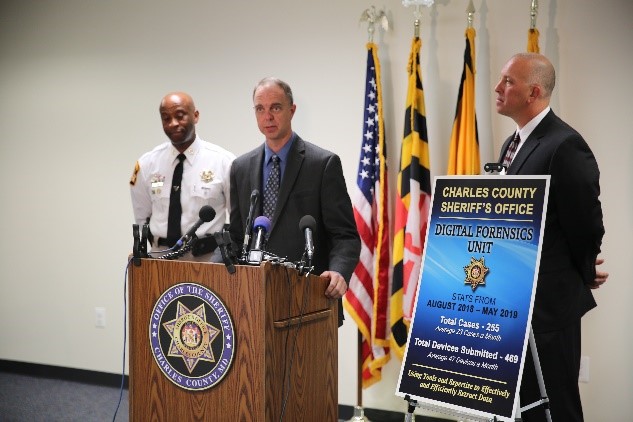
Mr. Justin Brackett, DFU Examiner, answers media questions about DFU capabilities.
technology to help solve crimes. In May, the Agency unveiled its newly acquired Digital Forensic Unit (DFU), which is currently overseen by Captain Joseph Pratta, Commander of the Criminal Investigations Division, and comprised of two full-time digital analyst experts. “Our examiners have had the opportunity to make significant contributions to our investigations. Along the way, they’ve educated detectives on collection of evidence and where that evidence hides on digital devices. They’ve advised Assistant State’s Attorneys on technical aspects of digital evidence for successful prosecutions. In a very short time, this new unit has become a successful and critical asset of the Criminal Investigations Division,” Sheriff Berry said.
In December, our Forensic Science Unit announced that it would be utilizing the National Integrated Ballistic Information Network (NIBIN) – a program managed by the Bureau of Alcohol, Tobacco, Firearms, and Explosives (ATF). The NIBIN program automates ballistics evaluations and provides actionable investigative leads in a timely manner by allowing forensic examiners to compare ballistic evidence to crimes throughout the region. “Being able to use the NIBIN system will expedite our investigations and quickly help us determine if cases could be linked, thus providing more leads to unsolved crimes,” said Sheriff Berry.
Decrease in Overdoses: Over the past several years, Sheriff Berry has made raising awareness of the opioid crisis a priority for the CCSO. In 2017, sign boards were installed in several places around the county to display the total number of overdoses reported, number of lives lost, and the number of lives saved by Narcan. In 2018, the CCSO unveiled the HOPE (Heroin Overdose Prevention Education) trailer. This mobile educational tool was designed to raise awareness and inform parents of the warning signs related to drug abuse. Since 2017, overdose deaths in Charles County have decreased by more than 36 percent. “We truly care about our community and increasing awareness about the dangers of heroin and opioids,” said Sheriff Berry. “We will not stop until the number of overdoses stays at zero and all of the criminals distributing this poison are held accountable.”
Meritorious Service: In early November, 41 CCSO employees were honored at a banquet for saving lives, bravery, superior field service, and going above and beyond in their job duties. There were also 24 retirees honored at the banquet, who served a combined 585 years at the Charles County Sheriff’s Office. Of the award recipients, one officer received a medal of valor,

Cpl. Norris receives a Meritorious Service Award and CFC Keys receives the Bronze Medal of Valor.
our highest honor. CFC Eric Keys was awarded the Bronze Medal of Valor for his actions on March 13, 2019, which saved the life of a woman who was trapped in a burning vehicle. Cpl. Phillip Norris received a Meritorious Service Award for his actions in this incident. Both officers were recognized throughout the year by various organizations for their heroic efforts.
Captain David Kelly was recognized as Deputy of the Year by the Maryland Sheriff’s Association in the category of Contributions to Profession during the MSA’s annual conference in September. Captain Kelly, who is also an FAA certified pilot, established the Agency’s unmanned aerial system (UAS/drones) program, developed policies and coordinated training to get the program in compliance with FAA regulations. His research and work with UASs has been so successful that agencies throughout the DC metropolitan region have requested and received guidance from Captain Kelly and his team. Corporal Brad Saunders was also recognized by the Maryland Sheriff’s Association for his work in establishing and monitoring the Agency’s new Tow Program, which went into effect in 2018 after other Traffic Operations officers successfully pushed for legislation mandating all tow companies in Charles County be registered through the CCSO. Cpl. Saunders received the Traffic Safety Award for these efforts. In November, PFC Richard Pickeral was named Law Enforcement Officer of the Year, Waldorf district, by the Knights of Columbus. He was honored for being a good patrol officer who provides outstanding service in the areas of investigations, recovered stolen autos, and narcotics.
Community Outreach: The CCSO continued its partnerships with organizations such as the Center for Abused Persons (CAP), Charles County Crime Solvers, Parents Affected by Addiction (PABA), Special Olympics Maryland, and Lifestyles of Maryland. Citizens showed their support by participating in events such as the Crime Watch Kickoff, Citizens Advisory Council Meetings, the Law Enforcement Torch Run, and National Night Out. We hosted our fourth Citizens Police Academy, a free 12-week program in which citizens are invited to apply to participate to learn all about the functions of the Sheriff’s Office.
The CCSO, along with the Charles County Correctional Officers Association (CCCOA) and the Charles County Black Officers Association (CCBOA), participated in many outreach projects including the Children’s Aid Society’s Christmas Connection Program, the United Way of Charles County’s annual
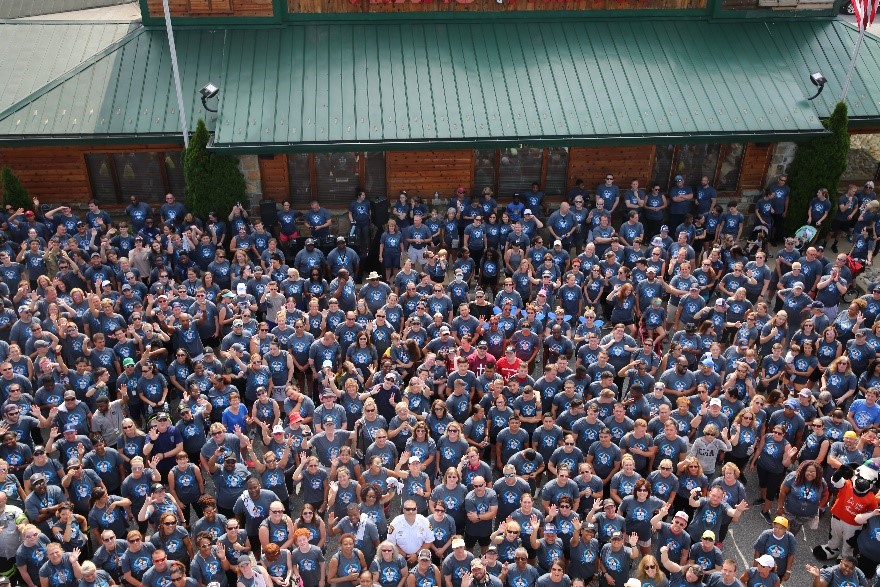
Hundreds of participants supported the Torch Run.
“Day of Caring,” and Special Olympics Maryland through fundraising at the Torch Run in June and Cops on Rooftops in September. The Corrections Division spearheaded many of its own outreach projects, to include the annual Toy Drive in support of Christmas Connection. In 2019 they raised their record high of over $12,000 in toy donations. They also hosted their annual Reentry Fair for inmates preparing for release and a Christmas in April project. On December 7, the Charles County Fraternal Order of Police, Lodge 24 hosted its 12th annual Shop with a Cop event with help from members of the CCSO, La Plata Police Department, Maryland State Police, and Maryland Transportation Authority Police (Harry Nice Bridge), taking more than 60 Charles County children to Walmart where each child was able to purchase gifts for themselves and their families. The K9 Unit spearheaded Operation Santa Paws, in which they got together and pitched in their own money to provide a special Christmas surprise for a local family.
“The organizations, businesses, and volunteers we work with in our community to give back are a driving force in our success as an Agency,” said Sheriff Berry. “It is through those critical partnerships that we are better able to protect and serve.”
Engaging with our Youth: Reaching out to the youth in Charles County remained a top priority for Sheriff Berry and the men and women of the CCSO. For the fourth straight year, Sheriff Berry visited each and every elementary and middle school in Charles County in order to conduct “wellness visits.” “My desire to become a police officer began when I was in elementary school. An officer came to my school to talk to me and it meant the world to me,” says Sheriff Berry. “Visiting our schools is a way that I try to pay back what that officer did for me.”
Other officers and employees also took part in strengthening relationships with our youth. Many officers participated in Career Days or other special events at the schools. Our School Resource Unit continued its tradition of hosting several camps for the elementary and middle school students over the summer. In June, after school let out, they kicked off the summer with
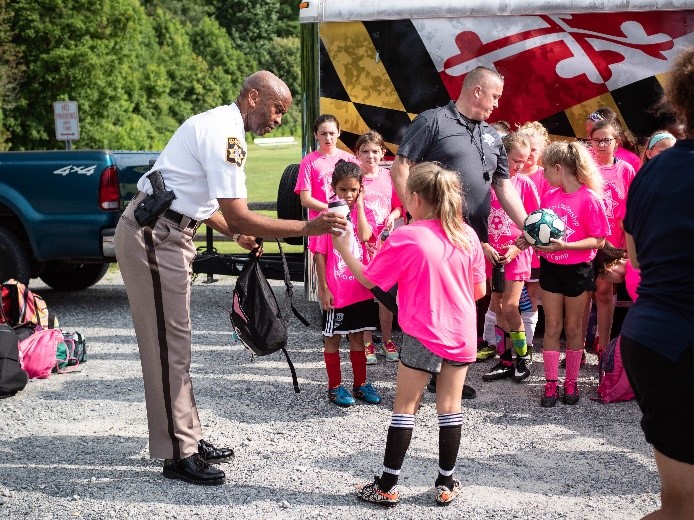
Sheriff Berry hands water to a Soccer Camp participant.
the Cops for Kids football camp at North Point High School. In July they hosted the Ladies Leadership soccer camp and the Badges for Baseball camp, which both took place at Laurel Springs Regional Park. They also hosted the Summer Youth Achievement Program for four weeks at St. Charles High School, and the Just Say No Camp in August at the College of Southern Maryland. Officers assisted with programs to provide free lunch to students over the summer, and others helped with providing backpacks before school started back up in September. The We Care Safe Driving Program also continued last year, encouraging teen drivers to buckle up, slow down, and keep their attention on the road.
“The CCSO continues to grow in numbers, but remains a close family with strong ties to our community,” said Sheriff Berry. “I am proud of what we accomplished in 2019, and I look forward to what a new decade will bring.”
About Our Agency
Office of the Sheriff: The OFFICE OF THE SHERIFF is comprised of the Sheriff, Chief of Staff, two Assistant Sheriffs, the Office of Professional Responsibility, and the Office of the General Counsel.
Sheriff Troy D. Berry is a 26-year veteran of the Charles County Sheriff’s Office and was first elected as Sheriff in 2014. He was re-elected in 2018. He leads an Agency of over 650 employees and is the final authority on all matters of policy, operations, and discipline.
Lieutenant Colonel David Saunders serves as Sheriff Berry’s Chief of Staff. He is the highest responsible senior administrative and supervisory authority of all employees of the Agency. Lt. Col. Saunders has been with the Charles County Sheriff’s Office for over 30 years and most recently served as the Assistant Sheriff of Operations.
Two Assistant Sheriffs are responsible for the day-to-day operations of the Agency. Major Michael Almassy serves as the Assistant Sheriff of Operations and is responsible for Patrol Operations, the Criminal Investigations Division, and the Special Operations Division. Mr. Brian Eley serves as the Assistant Sheriff of Administration and is responsible for the Corrections Division, the Special Services Division, the Information Services Division, the Executive Services Division, the Training Division, and the Administrative Services Division.
The Office of Professional Responsibility (OPR) is an independent component of the CCSO and maintains the integrity of the Agency by ensuring the professional conduct of Agency personnel. OPR’s two functions include Internal Affairs and Standards and Audits, and it operates under the command of Captain William Edge.
Internal Affairs (IA) handled thirty-six (36) cases in 2019. Of those, two (2) were exonerated, six (6) were unfounded, nine (9) were sustained, five (5) were not sustained, one (1) was sustained for MDT User Responsibilities and exonerated for Violation of Laws, one (1) was sustained for Performance of Duty and not sustained for Unbecoming Conduct, one (1) was unfounded for Improper Handling of Evidence and Falsifying Records and not sustained for Courtesy, one (1) was sustained for Unbecoming Conduct and not sustained for Violation of Laws, one (1) involved two officers; Unprofessional Language was sustained for the first officer, Performance of Duty was unfounded and Courtesy was not sustained for the second officer, and eight (8) remained open. There was also an investigation done for the Prince George’s County Police Department and that was closed with no sustained findings. The IA cases involved twenty-six (26) police officers, ten (10) correctional officers and two (2) civilian employees.
The Office of the General Counsel is assigned to represent the Office of the Sheriff and serves as the Agency’s liaison with the County Attorney’s Office and the Maryland Attorney General’s Office. Mr. Jerome Spencer, a former prosecutor and Circuit Court Judge, serves as the Agency’s General Counsel, and Ms. Misty Good serves as Associate Counsel.
Patrol Division: When life or property is in peril, citizens rely on the protection of the CCSO’s first responders — the officers of the PATROL DIVISION — whose chief responsibilities are maintaining law and order and restoring peace when public safety is threatened. The Patrol Division prevents and investigates crime, responds to calls for service, and enforces traffic laws. It is the CCSO’s most visible component. Captain Charles Baker serves as the Commander of the Southern District and Captain Jason Carlson serves as the Commander of the Northern District.
Five shifts of 22 patrol officers (ranked corporal and below) and four sergeants each provide police services day and night throughout Charles County. Each officer is assigned to either the Northern District or the Southern District of the county. Additionally, 11 lieutenants serve as shift commanders in the Patrol Division, ensuring a commander is always on duty in both the Northern District and Southern District. Shift commanders coordinate the Patrol Division’s response to major incidents and make critical operational decisions.
Patrol officers responded to 75,347 calls for service in 2019, which included a variety of emergency and non-emergency situations.
Patrol officers made 2,697 arrests in 2019. These include not only arrests made on-scene after responding to calls but also those made after interrupting crimes in progress during proactive patrols, during traffic stops where more serious crimes like drug or weapon possession are uncovered, and as a result of extensive investigations.
Special Operations Division: The SPECIAL OPERATIONS DIVISION performs tactical assignments and provides community and school-based services that engage citizens and businesses in public safety activities. Captain Robert Kiesel is the division’s commander. The division includes two sections: Special Operations and Community Services.
The Special Operations Section is supervised by Lieutenant Jon Burroughs and includes the Traffic Operations Unit, Marine Unit, K9 Unit, and the Emergency Services, Hostage Negotiations, and Special Events Response Teams.
The Traffic Operations Unit investigates traffic fatalities, school bus crashes, school bus complaints, and abandoned vehicles; conducts radar operations and commercial vehicle inspections; manages crossing guard assignments; provides funeral escorts; and manages all traffic-related grants awarded to the CCSO.
- Between January 1, 2019, and December 31, 2019, the Charles County Sheriff’s Office investigated six (6) motor vehicle crashes resulting in fatalities. Three (3) of these fatal crashes were alcohol-related.
- The CCSO conducts selective enforcement using funding provided by the Maryland Department of Transportation, Maryland Highway Safety Office (MHSO). This funding is provided via grants to enforce laws combating aggressive driving, distracted driving, seatbelt violations, pedestrian area patrols and impaired driving.
The Marine Unit is a specially-trained team of officers and civilians who provide law enforcement services on the waterways of Charles County. The vessels are specially designed for law enforcement use and are equipped to handle a variety of possible situations.
The K9 Unit is comprised of seven officers, a sergeant, a trainer, and 11 dogs which include eight Patrol/Narcotics canines, one bloodhound, and two explosive/weapon detection canines. Each K9 team is certified by the United States Police Canine Association (USPCA). In 2019, the unit conducted 103 building searches, 13 evidence searches, 22 humanitarian searches, 10 weapons scans, 3 explosive scans, and 66 tracks, and it provided 20 demonstrations for various groups around the county. As a result of this work, the Unit made 71 patrol arrests and 38 narcotics arrests.
The Special Events Response Team (SERT) is comprised of 40 CCSO officers and 5 La Plata Police Department (LPPD) officers who respond to large-scale demonstrations, natural disasters, and other significant events that require additional manpower and resources.
The Hostage Negotiations Team is specially trained to bring situations involving barricaded individuals and hostages to peaceful conclusions. Negotiators volunteer for the team in addition to their regular duty assignments.
The CCSO’s Community Services Section, under the command of Lieutenant Scott Grove, administers innovative and effective crime prevention programs, provides instruction and security in county schools, and leads numerous community outreach efforts. As a testament to the success of the Community Services Section’s programs and its commitment to working closely with citizens and businesses to prevent crime, the CCSO has received the Maryland Governor’s Crime Prevention Award each year since 1988. The Community Services Section oversees the Community Oriented Policing Services (COPS) Unit, Crime Prevention Unit, School Resource Unit, Teen Court, the Honor Guard, and the Criminal Justice program.
The Community Oriented Policing Services (COPS) Unit is comprised of nine officers and one sergeant who maintain ties with neighborhoods that participate in the program. Each neighborhood works with one COPS officer who helps implement crime prevention programs; addresses problems and concerns; attends community meetings; and conducts foot, bicycle, and ATV patrols. As a result of their diverse training, these officers are often assigned to special details to address specific crime trends in the county. In 2019, the COPS Unit attended 180 community meetings and worked 1,760 hours of special events in the community.
To better address community needs, the Community Services Section was reorganized. The Crime Prevention Unit was reinstated in May of 2018 and now includes Teen Court, a Community Organizer, Alcohol Enforcement, Electronic Fingerprint Unit, and Criminal Justice Program (at North Point High School) . The unit is tasked with coordinating various events such as National Night Out, The Charles County Fair Display, Project Graduation, Crime Watch Kickoff and Citizens Advisory Council. The Crime Prevention Unit is responsible for the Project Lifesaver Program, various safety presentations for the commercial and residential community, Neighborhood Crime Watch Training and residential and commercial security assessments. In 2019, the Crime Prevention Unit made 96 presentations, attended 40 community meetings and events, and performed 797 commercial security assessments and 911 information updates for local businesses.
The School Resource Unit facilitates the strong alliance between police and Charles County school students. As part of an agreement with Charles County Public Schools, officers are assigned to each elementary, middle, and high school to provide programs such as Safe Schools, Truth and Consequences, and Drug Abuse Resistance Education (DARE). The officers host a Ladies Leadership Soccer Camp, Badges for Baseball Camp, Cops for Kids Football Camp, DARE conference, a Summer Youth Achievement Program, and We Care, a program designed to reduce teen traffic fatalities by using innovative methods to encourage young motorists to drive safely. This unit also operates a Student Crime Solvers program, which provides an opportunity for reward money when students anonymously submit information about crimes in schools. The program is offered in conjunction with Charles County Crime Solvers.
Teen Court provides first-time youth offenders with an opportunity to accept responsibility for traffic offenses, misdemeanor crimes, and tobacco and alcohol offenses without the stigma of a formal criminal record. Youth offenders are represented by youth defense attorneys, prosecuted by youth prosecutors, and sentenced by youth juries. An adult volunteer serves as a judge. The program teaches students about the criminal justice process, helps them better resolve problems, and reduces recidivism. In 2019, Teen Court heard 118 cases and sentenced youth offenders collectively to 3,324 hours of community service.
The Community Services Section also supervises the Honor Guard, which was originally formed to assist families of fallen officers at funerals. It is now a dignified presence at many CCSO and community functions including police and correctional officer graduations and an annual candlelight vigil hosted by the Center for Abused Persons. In 2019, the Honor Guard participated in 16 assignments ranging from community events to Line of Duty death funerals. Additionally, the team trained on 12 separate days for 2 hours each time.
High school students considering a career in law enforcement have an opportunity to learn about the criminal justice system as part of their academic curriculum in the Criminal Justice Program offered through an alliance between the CCSO and Charles County Public Schools. The program is held at North Point High School.
Criminal Investigations Division: The CRIMINAL INVESTIGATIONS DIVISION (CID) investigates complex crimes and crime trends. Under the command of Captain Joseph Pratta, the division operates four sections — Persons Crimes, Property Crimes, Homeland Security, and Narcotics Enforcement.
The Persons Crimes Section, commanded by Lieutenant Andrew Schwab, includes the Major Crimes, Special Victims, Robbery, and Forensic Science Units.
The Major Crimes Unit investigates homicides, deaths, shootings, stabbings, life-threatening assaults, cold cases, missing persons, and the rare occurrences of police-involved shootings. Detectives investigated four homicides in 2019, in three separate cases. By year’s end, two of the cases were closed; there was an arrest made in the third case but the investigation remained ongoing.
The Special Victims Unit (SVU) investigates rapes, sexual assaults, physical and sexual child abuse, and the exploitation of the elderly. The circumstances of these investigations can be difficult and very emotional for detectives. Detectives in the SVU were assigned 304 cases in 2019. At the year’s end:
- 46 were closed;
- 104 were closed with arrests;
- 14 were closed exceptional;
- 10 were closed unfounded;
- 90 were open/suspended;
- 5 cases open warrant service;
- 35 intakes were accepted;
- 321 intakes were screened out for various reasons.
The Robbery Unit investigates citizen and commercial armed robberies. In 2019, the unit was assigned 42 cases. Of those cases, at the end of the year:
- 19 were closed with arrests;
- 12 were open/suspended;
- 10 were still active;
- 1 open warrant service.
The Forensic Science Unit (FSU) is comprised of a sergeant, evidence technicians, and latent fingerprint examiners who provide critical support to patrol officers and detectives by processing crime scenes and analyzing evidence. In 2019, the FSU was assigned 638 cases. Technicians processed more than 50 scenes, including crime scenes, vehicles, and autopsies. They investigated approximately 425 cases involving DNA, totaling approximately 1,568 DNA items, and approximately 130 cases involving firearms, totaling 252 firearms. There were 242 latent fingerprint cases resulting in 50 identifications made.
In September, the FSU began utilizing the National Integrated Ballistic Information Network (NIBIN) – a program managed by the Bureau of Alcohol, Tobacco, Firearms, and Explosives (ATF). The NIBIN program automates ballistics evaluations and provides actionable investigative leads in a timely manner by allowing forensic examiners to compare ballistic evidence to crimes throughout the region. Between September 20 and December 31, the FSU had 62 cases with NIBIN entries resulting in 110 correlation requests, 9 leads, and 3 leads warranting microscopic comparison.
The Property Crimes Section, commanded by Lieutenant Ashley Burroughs, investigates property and financial crimes; analyzes crime trends; and provides services to crime victims.
In 2019, the Property Crimes Unit investigated 70 cases, closed 23 and made 28 arrests. There were 353 burglaries in 2019; 86 were commercial and 267 were residential.
The Financial Crimes Unit investigates fraud schemes, identity theft, and embezzlement. In 2019, detectives investigated 118 cases. Of these investigations, 110 cases were closed and 46 arrests were made by the end of the year.
Detectives assigned to the Auto Theft Detail were assigned 66 cases and made 52 arrests in 2019. A total of 151 vehicles were stolen in Charles County, and 120 were recovered. There were an additional 45 vehicles recovered which were stolen from out of the County.
The Crime Analysis Unit collects, analyzes, and disseminates crime data for the CCSO’s CompStat program. CompStat is an analysis-driven method of proactively addressing crime problems. District Commanders use the crime analysis data as part of weekly CompStat meetings to address crime in their districts. Since the inception of CompStat in 2009, Part I Crimes have dropped nearly 30% in Charles County.
The Victim Services Unit works with local, state and regional agencies including the Center for Abused Persons, the Center for Children, the Criminal Injuries Compensation Board, and Victims Information and Notification Everyday (VINE) to ensure victims understand their rights and have access to counseling and compensation.
The Homeland Security & Intelligence Section, commanded by Lieutenant Chris Schmidt, investigates street gangs, outlaw motorcycle gangs, extremist activities, threats against public officials, terrorism, and organized crime. The Section receives and disseminates intelligence information and publishes law enforcement bulletins for the CCSO and allied agencies nationwide. An investigator from the Homeland Security & Intelligence Section is also part of the Southern Maryland Information Center (SMIC), a regional operation that facilitates information sharing between the CCSO, the Calvert and St. Mary’s County Sheriffs’ Offices, the Maryland State Police and the Maryland Coordination and Analysis Center. Representatives from each agency analyze reports and identify cross-jurisdictional crime trends.
The Narcotics Enforcement Section (NES), commanded by Lieutenant Ben Voorhaar, works covertly and aggressively to disrupt drug trafficking in Charles County. The effective disruption of drug trafficking is vital to the reduction of crime overall. The section includes the Major Narcotics Unit and the Narcotics Street Enforcement Unit. In 2019, NES investigations led to executing 114 search warrants and the seizure of 82 firearms, 6 vehicles (valued at approximately $152,681.00), $84,980.08 in currency, 130 grams of cocaine, 230 grams of crack cocaine, 302 grams of heroin, 31 doses of LSD, and 12.9 pounds of marijuana.
The CCSO employs a full-time Heroin Coordinator as part of the Opioid Addiction Program. In 2019, there were 135 overdose incidents in Charles County. Narcan was administered 70 times, and there were 23 overdose deaths. The average age of the involved parties was 32.5.
Corrections Division: The responsibility of keeping inmates at the Charles County Detention Center (CCDC) secure rests with the CORRECTIONS DIVISION under the command of Director Brandon Foster and Deputy Director Robert Studds. The CCDC is a secure facility that opened in 1995 and stretches 135,000 square feet with 203 cells. In 2019, Corrections processed 7,556 arrests through intake and booked 2,376 incarcerated individuals into the facility. The CCDC maintained an average daily population of 223 inmates.
The Custody and Security Section, commanded by Captain Ryan Ross, is responsible for internal and external security of the facilities. This section is comprised of four security teams which are the main operational element of the Corrections Division.
Four Lieutenants serve as Shift Commanders to ensure there is always a commander on duty. The Shift Commanders manage the daily security operations of the detention center. The four Shift Commanders are Lt. Jonathan Palmer, Lt. James Kelly, Lt. Tony Oliver, and Lt. Matthew Irby.
The Special Services Section, commanded by Captain Gerald Duffield, is responsible for standards and accreditation, training, security maintenance, inmate commissary, and supplies.
The Standards and Accreditation Commander is Lt. Richard Hulvey. He conducts audits and inspections to ensure the CCDC operates according to the hundreds of standards set by the Maryland Commission on Correctional Standards (MCCS). In 2001, the CCDC became the first detention facility in Maryland to score 100 percent on an MCCS audit and achieved 100 percent scores after audits in 2004, 2006, 2009, 2012, and 2016.
Lt. Matthew Becker serves as the Corrections Division’s Training Commander. He ensures all correctional officers fulfill training obligations mandated by the Maryland Police and Correctional Training Commissions (MPCTC).
Lt. Brian Gardiner serves as the Corrections Division’s Facilities Management Commander. He ensures the facilities are well maintained and properly supplied. He also works closely with contractors who maintain various systems and equipment within the detention center.
The Support Services Section, commanded by Captain Amy Stine, is responsible for central processing and inmate programs and services. This section also oversees the inmate library and the law library.
Lt. Matthew Dixon serves as the Central Processing Commander. He ensures the completeness, accuracy, and security of inmate records and maintains communication with court systems, police agencies, and other correctional facilities. The unit is comprised of Records, Intake, Finance, Transportation, and Court Holding.
Lt. Stacy Kelly serves as the Inmate Services Commander. She strives to reduce recidivism by offering programs that help inmates re-enter society as productive citizens. One program, Successful Transitioning and Reentry Skills (STARS), provides inmates with skills and knowledge to help them succeed in life. Inmates who apply for the program write a resume and appear before an interview panel. Other inmate programs include the Diamonds Program, a faith-based life-skills and transitioning program that addresses specific issues for female inmates, a General Equivalency Diploma (GED) program, and an annual Re-Entry Fair.
Lt. Ryan Taylor serves as an Office of Professional Responsibility (OPR) investigator to ensure the integrity of Corrections Division personnel.
The Corrections Division operates the Detention Center Annex adjacent to the primary Detention Center. The Annex houses inmates assigned work-release and school release. The building served as the county jail from 1981 to 1995 and reopened as the Annex of the current detention center in 2007 to better utilize bed space and alleviate overcrowding in the primary detention center.
Support Services Division: The employees of the INFORMATION SERVICES DIVISION, commanded by Captain Chris Bean, are the critical link between citizens and the police and between officers and the information they need to do their jobs safely and efficiently. The division also manages the Agency’s computers and software.
The Records Management Section, managed by Deputy Director Judy Torney, preserves and maintains thousands of reports filed through the CCSO each year. In 2019, the employees in this section:
- Processed and catalogued 25,017 police reports and supplemental reports which includes incidents, accidents, missing person, alcohol influences reports;
- Scanned and filed 5,241 arrest cards with charging documents;
- Entered 12,633 property forms;
- Completed 1,553 expungements;
- Processed 34,185 citations including ETIX, parking citations, warnings, traffic stop data sheets, and safety equipment repair orders;
- Recorded 2,042 false alarm notifications;
- Validated 2,232 METERS entries;
- Handled all initial questions from 5,611 visitors to the Sheriff’s Headquarters;
- Answered 7,903 telephone inquiries;
- Processed 15,842 pieces of postal mail;
- Processed 1,174 In-car camera video requests, 2,361 State’s Attorney’s Discovery requests and 3,546 other report requests.
The Communications Section, commanded by Lt. Charles Gass, provides police radio communications to officers and clerical coverage of the district stations in La Plata, Bryans Road, and Waldorf. Each district station is staffed by Station Clerks responsible for answering the CCSO’s non-emergency telephone lines and for helping citizens who visit the district stations. The station clerks’ training prepares them to handle a variety of citizen reports and inquiries, from life-threatening emergencies to the occasional non-police matter. Their primary mission is to obtain clear and concise information and relay that information to Police Communications Officers (PCOs), who dispatch the information to officers conducting patrol or other assignments.
Information Technology Division: The INFORMATION TECHNOLOGY DIVISION (ITD), led by Director David Hanna, is vital in ensuring the CCSO functions efficiently in our digital world. ITD develops and implements a strategic plan to maintain and evolve systems, infrastructure, physical and virtual servers, enterprise applications, security, cloud, mobile initiatives, training and future growth to support the objectives and success of the Charles County Sheriff’s Office. The highly knowledgeable staff assigned to the Applications Support, PC Operations, and Systems Operations Support Sections maintains hundreds of PCs, printers, networks, complex servers, and software applications. Every function of the CCSO relies on the daily use of computers and digital police databases, and the ITD personnel are always available to ensure law enforcement services are uninterrupted.
Special Services Division: The SPECIAL SERVICES DIVISION, commanded by Captain Daniel Gimler, handles judicial matters, ensures the security of the Charles County Courthouse, and maintains the Agency’s fleet, supply stock, and property inventory.
The Judicial Services Section, commanded by Lieutenant William Donley, serves arrest warrants, civil papers, and other legal documents; addresses child support and domestic violence problems; and provides Courthouse security services. In 2019, the Judicial Services Section served 1,619 criminal summonses, 2,117 warrants, 3,931 evictions, 1,969 protective orders and 953 peace orders.
The Property Management Section, commanded by Lieutenant Scott Fetterolf, manages the CCSO’s Quartermaster, Fleet Management, Property Held Unit, and Firearms Tracking Operations.
Executive Services Division: The EXECUTIVE SERVICES DIVISION, commanded by Captain David Kelly, manages Planning and Accreditation, Media Relations, the Chaplain program and acts as the liaison to the Sheriff.
Planning and Accreditation, managed by Deputy Director Laurie Coyle, writes and maintains the policy contained in the CCSO’s Administrative and Operational Manual and ensures the CCSO maintains its internationally recognized accreditation from the Commission on Accreditation for Law Enforcement Agencies (CALEA). The Agency continues to maintain the highest standards and continues to earn a Gold Standard of Excellence.
The Agency’s Grant Coordinator researches, applies for and maintains grants the agency uses to fund vital projects necessary to complete our mission. This year, the agency applied for and was awarded over $1.2 million in grants.
The Media Relations Office coordinates the distribution of information about police investigations, crime prevention, and CCSO events to the news media and public. The office issues regular press releases; manages the content of the CCSO’s website; produces the Annual Report, an internal newsletter, advertisements, brochures, posters, and fliers; and manages the CCSO’s social media accounts. At the end of 2019, the CCSO reached over 68,000 people through Facebook, Twitter, Instagram, and Nextdoor.
Local clergymen offer guidance and inspiration to CCSO personnel and the public through Chaplain Services. Chaplains minister to CCSO personnel in times of personal need or strife and provide comfort to those who are injured or afflicted. They accompany officers who must notify families of the death of a loved one and would assist in notifying the family of an officer who was seriously injured or slain. Chaplains also provide invocations and benedictions at CCSO ceremonies.
Administrative Services Division: The CCSO is committed to maintaining a highly qualified workforce, to utilizing financial resources efficiently, and to maintain thorough and accurate record keeping. The ADMINISTRATIVE SERVICES DIVISION, commanded by Captain Ronald Farrell, is responsible for helping the CCSO meet its strict personnel, budgetary, and records management standards.
The Financial Services Section, managed by Deputy Director Erin Shoemaker, ensures the integrity and accuracy of the CCSO’s financial operations. A well-trained team of finance professionals promotes sound financial management practices, accounts for CCSO-owned property, effectively allocates resources, oversees the budget preparation process, and assists in meeting the CCSO’s operational needs. The FY2019 approved budget (which runs from 7/1/18 through 6/30/19) was $90,287,800. This included a 1% COLA and merit increase for all eligible employees who were not governed by collective bargaining. The authorized strength of the Sheriff’s Office was increased by six (6) new sworn officer positions on July 1 and four (4) new correctional officers on January 1. Additional support staff for the Sheriff were authorized as follows:
- Upgraded four (4) Court Security Deputies from Full Time Reduced Hours to Full Time
- Upgraded one (1) Fleet Technician from Full Time Reduced Hours to Full Time
- Increased hours of three (3) Part Time Background Investigators to Full Time Reduced Hours
- Increased hours of one (1) Part Time Background Administrative Assistant to Full Time Reduced Hours
- Increased hours of one (1) Part Time Court Security Deputy to Full Time Reduced Hours
- Continuation of funding for one (1) Domestic Violence grant position.
The FY 2019 budget included $3,161,000 for Sheriff’s Office vehicles and equipment.
The FY2019 budget included Capital Lease agreement funding of $840,000 to complete the final phase of the In-Car Cameras.
The Red Light and Speed Camera Finance Section is responsible for the financial review of the CCSO’s red light camera and school zone speed enforcement camera programs.
The Human Resources Section, managed by Deputy Director Brian Daniels, handles administrative personnel tasks for potential and current employees. Once the Human Resources Section determines an applicant meets position requirements, the Pre-Employment Investigations Unit performs an extensive background investigation of the applicant. The unit’s mission is to ensure only the applicants with the highest levels of integrity are awarded positions with the CCSO. Background investigations involve polygraphs, psychological examinations, physical examinations, and drug screenings.
The Pre-Employment/Recruitment Unit seeks the best potential police and correctional officer candidates for employment with the CCSO. The unit attends job fairs and other events to engage those who are interested and to guide those who have decided to pursue careers in law enforcement.
Training Division: The TRAINING DIVISION ensures the CCSO meets state-mandated requirements and provides a variety of other training needs. Commanded by Captain Kevin Leahy, the division is comprised of the Southern Maryland Criminal Justice Academy, the Firearms Instruction Detail, and the Cadet Program.
The Southern Maryland Criminal Justice Academy (SMCJA) provides entry-level training to all police and correctional officers in Southern Maryland. The SMCJA is funded and governed by the sheriffs’ offices in Charles, Calvert, and St. Mary’s Counties, which provide the Academy’s full-time staff of instructors and support personnel.
Once officers have completed entry-level training, they must complete a required number of hours of “in-service” training. The Training Division handles all annual in-service training classes and ensures all required documentation is submitted to the Maryland Police Training Commission (MPTC) to maintain each officer’s State certification.
The Firearms Instruction Detail is comprised of highly-skilled instructors who must maintain expert proficiency in firearms. The Chief Firearms Instructor and his staff provide regular firearms training to all new and veteran officers and to Correctional Officers who carry firearms in the performance of their duties. In addition to the required qualification courses officers must complete annually for the handgun and twice annually for the shotgun and rifle, officers are also trained in tactical scenarios, shooting on the move, shooting behind various types of cover, general marksmanship skills, and various other courses of fire related directly to the performance of duties as a police officer.
People ages 18-21 who want to pursue a career as a CCSO police officer gain invaluable on-the-job experience in the Cadet Program. Cadets perform a variety of duties while learning law enforcement techniques, CCSO policy and procedure, and criminal and traffic law. These duties include traffic direction and enforcement, seatbelt and child safety seat inspections, flagging abandoned vehicles, and truck and school bus safety inspections.
ALL GAVE SOME, SOME GAVE ALL
Deputy Sheriff Lawrence H. McParlin
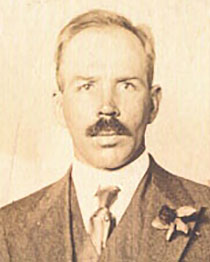
Deputy Sheriff Lawrence McParlin is the first Charles County Sheriff’s officer known to have fallen in the line of duty. On May 21, 1918, a short time after becoming a police officer, Deputy Sheriff McParlin and Metropolitan Police Department Officer John Conrad attempted to serve a court summons in Washington, D.C. As they entered the building, the suspect, who was wanted, shot and killed both officers. Learn more about Deputy Sheriff McParlin by reading “A History Lesson.”
Patrolman First Class Dennis L. Riley, #49
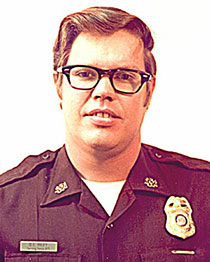
On January 11, 1977, PFC Riley was killed in a crash at the intersection of Route 228 and U.S. Route 301 in Waldorf. As he waited for a traffic light to change, a tractor-trailer fuel tanker skidded to a stop and overturned on his cruiser, killing him instantly. PFC Riley was survived by a wife and four children.
Sergeant Francis “Leo” Yates, #40
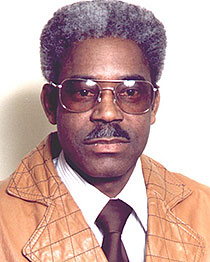
On June 8, 1988, Sgt. Yates suffered a fatal heart attack as he left the Charles County Courthouse. He was survived by a wife and four children.
Sergeant Joseph E. Stine, Jr., #62
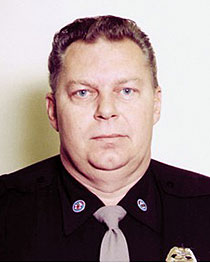
On May 12, 1990, Sgt. Stine arrested a disorderly subject and transported the resisting prisoner to the Charles County Detention Center. Sgt. Stine then collapsed and suffered a fatal heart attack. He was survived by a wife, two children and three step-children.
Sergeant Timothy C. Minor, #109
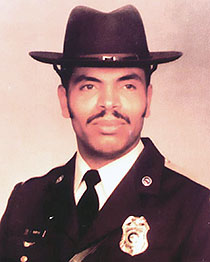
On February 12, 1996, Sgt. Minor was killed when a vehicle pulled in front of his police motorcycle on Route 257 in Newburg as he was responding to a call near Cobb Island. Sgt. Minor was survived by a wife and two children.
Station Clerk Willard C. Keesee, #1123
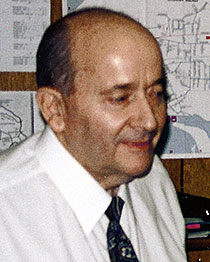
On January 23, 1998, Mr. Keesee was on-duty at the Indian Head District Station when he suffered a fatal heart attack. He was survived by two sons and a daughter.
Corporal Jamel L. Clagett, #447
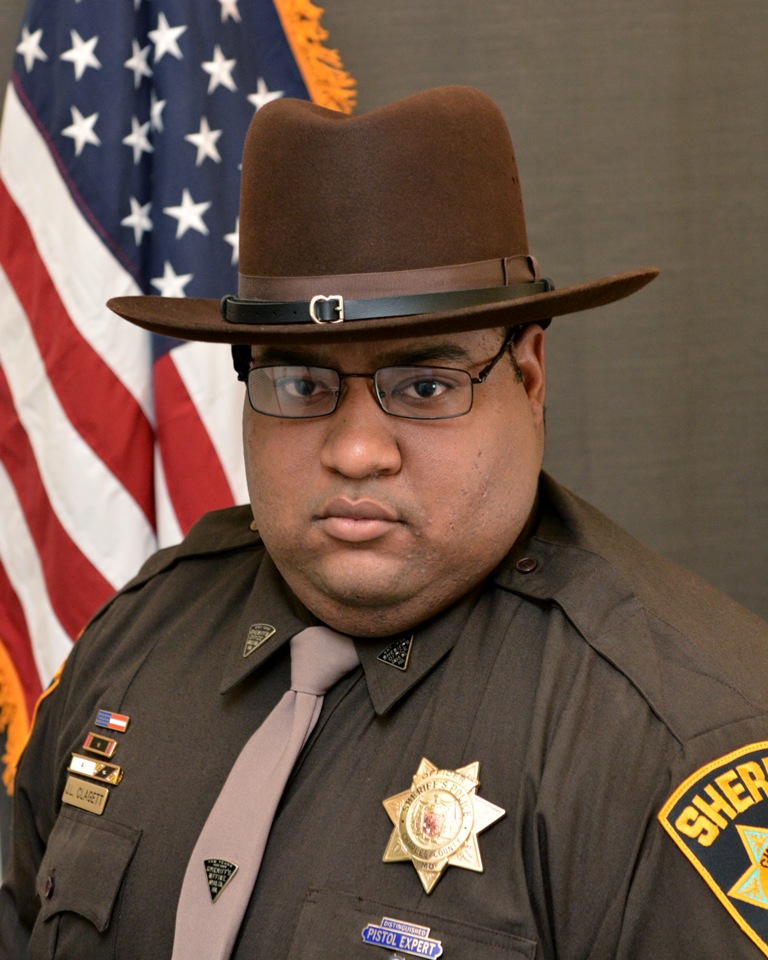
On December 21, 2014, Cpl. Clagett was killed in a single-vehicle crash on Route 218 near Route 641 in King George, Virginia, while returning home from working a midnight shift. He was survived by his mother, two brothers, and a sister.
Disclaimer: In the U.S.A., all persons accused of a crime by the State are presumed to be innocent until proven guilty in a court of law. See: https://so.md/presumed-innocence. Additionally, all of the information provided above is solely from the perspective of the respective law enforcement agency and does not provide any direct input from the accused or persons otherwise mentioned. You can find additional information about the case by searching the Maryland Judiciary Case Search Database using the accused's name and date of birth. The database is online at https://so.md/mdcasesearch . Persons named who have been found innocent or not guilty of all charges in the respective case, and/or have had the case ordered expunged by the court can have their name, age, and city redacted by following the process defined at https://so.md/expungeme.

